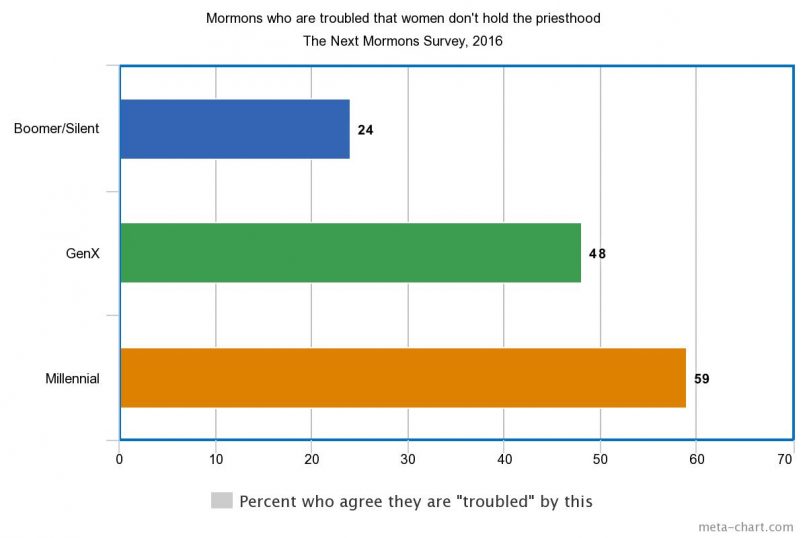In late October on a trip to South America, Russell M. Nelson, the president of the Church of Jesus Christ of Latter-day Saints, was asked by an Argentine reporter to explain women’s roles in the Church.
Here is some of that exchange, according to Church News editor Sarah Jane Weaver, who wrote about it last week:
“Many churches are ruled by men, at the exclusion of women,” said Mr. Rubin. “Is this the case for The Church of Jesus Christ of Latter-day Saints?”
“Well,” said President Nelson, “you should talk to a woman about that.”
President Nelson then turned and looked at Sheri Dew, executive vice president of Deseret Management Corporation, the CEO of Deseret Book Company, and former Relief Society General Presidency member.
“Can you help with this answer about the role of women in the Church?” he asked her. He motioned her into camera range.
Sister Dew told Mr. Rubin that he would have a hard time finding a church where more women have more authority than in The Church of Jesus Christ of Latter-day Saints.
“There are hundreds of thousands of women, right now, who have legitimate leadership opportunities and expectations. As women in the Church we teach and preach, we expound doctrine, we serve missions as full-time proselyting missionaries, and we have leadership responsibilities,” she said.
Then she added, “I actually feel ennobled by being a Latter-day Saint woman. Every opportunity for growth I have ever had has come because of the Church.”
I’m intrigued by this encounter, in part because it reveals some of the generational divide in the LDS Church about women’s roles. A male leader of the Greatest Generation delegated a question to a female leader of the Baby Boomer generation to try to convince people decades younger that Mormon women are thrilled with their position.
Dew focused on the short list of things that women can do in the LDS Church, rather than the longer list of things they cannot.
Women can teach and preach; they can be missionaries. All of that is true. They have “leadership responsibilities,” which in its own way is also true: Mormon women can have leadership responsibilities over other women and over children.
But religious leadership in other denominations goes beyond teaching and preaching. In the Mormon tradition, women are largely shut out from ritual authority and entirely shut out from administrative authority. Here are some helpful questions we can ask about religious authority, both ritual and administrative:
- Can women baptize?
- Can they be in charge of congregational finances?
- Can they plan and conduct weekly services?
- Can they plan and conduct special services (weddings, funerals, and holidays)?
- Can they supervise fellow religious leaders who are male as well as female?
- Can they formally counsel church members in an official capacity?
- Can they bless and serve communion?
The answer to all of these questions, in the Mormon context, is no. In fact, of the top seven denominations in the United States, the Church of Jesus Christ of Latter-day Saints is the only one that answers all of these questions with a “no.” In the Catholic Church, the largest denomination in America, women can’t be ordained as priests but can be lay ecclesial ministers with heavy responsibilities; in the United Methodist, PC(USA), and ELCA denominations, there are no restrictions at all on what women can do.
On social media in recent days I have seen various reactions to the comments by President Nelson and Sister Dew, mostly negative.
Several people, in fact, accused them of “gaslighting,” but that’s a misuse of the word. Gaslighting has become synonymous with “you disagreeing with me and trying to convince me of your point of view.” But the real meaning is much narrower: “you trying to convince me of a point of view which you already know to be false in order to cause me to doubt myself and my sanity.”
Gaslighting requires that its perpetrators actually know and understand that they are wrong. Gaslighters proceed anyway because they care more about undermining another person’s sense of authority than they care about the truth.
So in the Nelson/Dew case, “gaslighting” is not at all what’s going on. They completely believe that Mormon women lead the world in liberation.
In this, they are similar to many Mormons of their respective generations.
In the Next Mormons Survey (see here for methodology and further info), there was a clear divide between how older Mormons feel about women’s roles compared to younger ones. For example, only 24% of Boomer/Silent Mormons agreed that “the fact that women do not hold the priesthood sometimes bothers me,” meaning that the vast majority of these older generations are not troubled by the restrictions placed on women in the Church.

It’s a different story for younger Mormons. Among Millennials, roughly six in ten say they are bothered that women don’t hold the priesthood, a jump of 35 points.
That’s just the picture among people who still identify as Mormon. Among those who no longer consider themselves Mormon, three-quarters are bothered by women not holding the priesthood.
What’s more, for many of the women in the former Mormon sample, this was a strong enough frustration that it helped to push them out of the Church. Among former Mormon women, “the role of women in the Church” was the third most common reason cited out of thirty possible reasons for leaving the religion.
What we are seeing here is a generational shift. The answers that have worked for President Nelson and Sister Dew are less accepted among a generation that has grown up with women’s leadership being taken for granted everywhere . . . except at church.






